Handsome German film actor Rolf von Goth (1906-1981) appeared in minor roles in several silent films such as Fritz Lang’s s epic Metropolis (1927). In the late 1920s, he emerged as a prominent actor in Aufklärungsfilme (enlightenment films). During the early 1930s, he played a mixture of leading and supporting roles in dozens of films, including Es war einmal ein Walzer (1932) and Schuß im Morgengrauen (1932) but his appearances began to decline during the Nazi era. Later he switched to become a successful director and producer of radio plays.
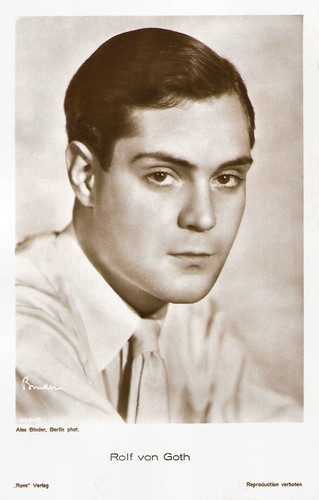
German postcard by Ross Verlag, no. 4661/1, 1929-1930. Photo: Alex Binder, Berlin.
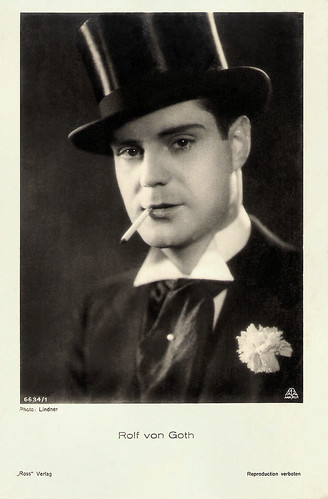
German postcard by Ross Verlag, no. 6634/1, 1931-1932. Photo: Aafa-Film / Lindner.
Rolf von Goth was born in 1906 in Windhoek in German Southwest Africa (then a German colony, now Namibia), where his father was stationed as an officer.
First, Rolf wanted to follow in his father’s footsteps, but he decided to become an actor. The dark-haired, handsome 20-years-old moved to Germany and started a film career there.
He initially appeared in minor roles in silent films such as the classic Science-Fiction epic Metropolis (Fritz Lang, 1927) as a son in the Eternal Gardens, the comedy Don Juan in der Mädchenschule/Don Juan in a Girls' School (Reinhold Schünzel, 1928) with Adolphe Engers, and the crime film Vom Täter fehlt jede Spur/Under Suspicion (Constantin J. David, 1928) starring Hanni Weisse.
He had a bigger part in Verirrte Jugend/Misled Youth (Richard Löwenbein, 1929), starring Fritz Alberti, Erna Morena and Dolly Davis. It was one of the many Aufklärungsfilme (enlightenment films) during the Weimar Era that addressed the issue of juvenile delinquency.
Von Goth then emerged as a prominent actor with a leading role in Vater und Sohn/Father and Son (Géza von Bolváry, 1929) as the son of Harry Liedtke.
His final silent film was the Aufklärungsfilm Frühlingserwachen/Spring Awakening (Richard Oswald, 1929), with Mathilde Sussin and Toni van Eyck. It is an adaptation of the play of the same title by Frank Wedekind about the rebellion of the youth and the increasingly debated erotic exploratory experiment. Von Goth got very good reviews for his role.
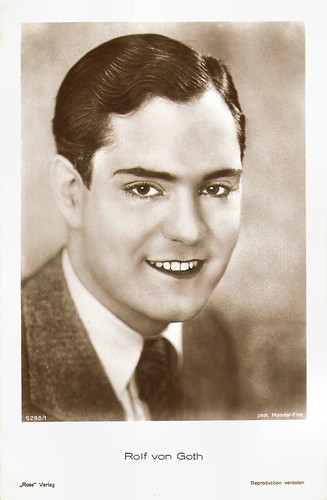
German postcard by Ross Verlag, no. 5280/1, 1930-1931. Photo: Mondial-Film.
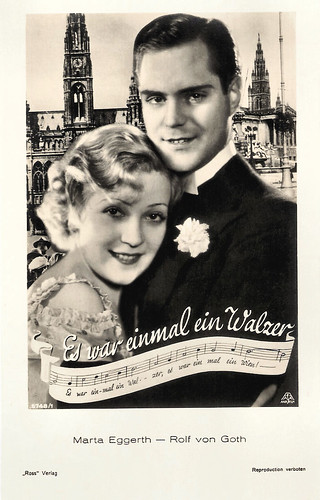
German postcard by Ross Verlag, no. 6748/1, 1931-1932. Photo: Aafa-Film. Publicity still for Es war einmal ein Walzer/Once There Was a Waltz (Victor Janson, 1932) with Márta Eggerth.
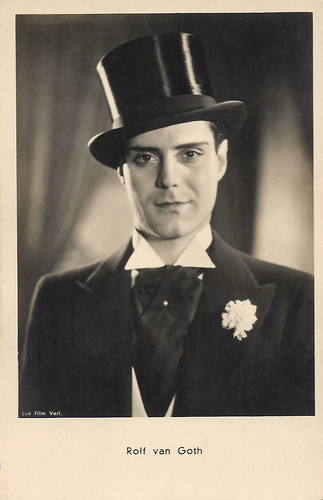
Austrian postcard by Iris Verlag, no. 6600. Photo: Lux Film Verleih.
During the early 1930s, Rolf von Goth played a mixture of leading and supporting roles in dozens of films, of the as the son-in-law. Stefanie D’heil calls him at Steffi-Line ‘Lieblings aller Schwiegermütter’ (the favourite of every mother-in-law).
In the operetta film Es war einmal ein Walzer/Once There Was a Waltz (Victor Janson, 1932), he co-starred with Márta Eggerth and Paul Hörbiger.
He had only a minor part in the crime film Schuß im Morgengrauen/A Shot at Dawn (Alfred Zeisler, 1932), starring Ery Bos and Genia Nikolaieva. The latter was based on the play The Woman and the Emerald by Harry Jenkins and recounts a jewel theft.
Then he co-starred with Jenny Jugo in the musical comedy Fünf von der Jazzband/Five from the Jazz Band (Erich Engel, 1932), produced by the German subsidiary of Universal Pictures.
Von Goth co-starred with Karin Hardt in Die blonde Christl/The blonde Christl (Franz Seitz, 1933) and they became also a couple in real life.
His appearances began to decline during the Nazi era. One of his last major roles was in Ein Mädchen mit Prokura/A Woman With Power of Attorney (Arzén von Cserépy, 1934), featuring Gerda Maurus. In 1938, the Gestapo arrested him after being denounced. It was the abrupt end of his film career.
After the outbreak of WW II, he had to go into the army, and was later imprisoned. During the wartime he only played one more small part in the revue-film Die Frau meiner Träume/The Woman of My Dreams (Georg Jacoby, 1944), starring Marika Rökk. After that he retired from the film business.
Von Goth switched to become a director and producer of radio shows for NWDR (later the SFB) in Berlin. During the post-war years, he was extremely successful in the format and produced more than two hundred radio plays.
In 1981, Rolf von Goth passed away in West Berlin, aged 75. He was buried at the Heerstraße cemetery in Berlin. Von Goth was married to the actress Karin Hardt.
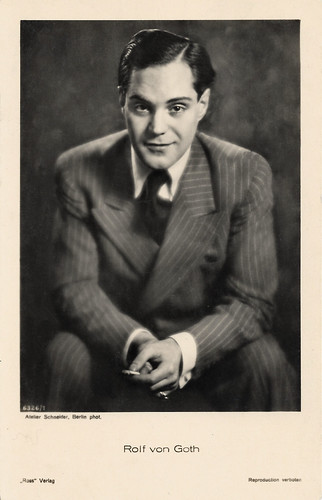
German postcard by Ross Verlag, no. 6326/1, 1931-1932. Photo: Atelier Schenker, Berlin.
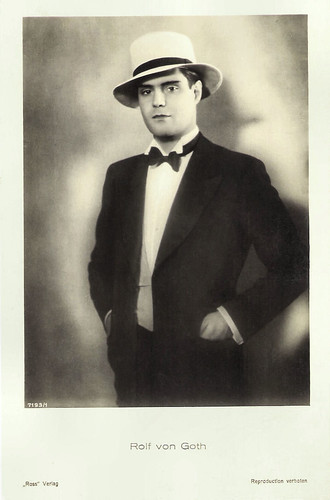
German postcard by Ross Verlag, no. 7193/1, 1932-1933.
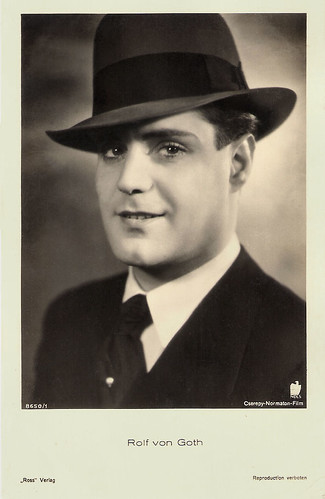
German postcard by Ross Verlag, no. 8650/1, 1933-1934. Photo: Cserepy-Normaton-Film / NDLS. Publicity still for Ein Mädchen mit Prokura/A Woman With Power of Attorney (Arzén von Cserépy, 1934).
Sources: Stephanie D’heil (Steffi-Line – German), Wikipedia (English and German), and IMDb.

German postcard by Ross Verlag, no. 4661/1, 1929-1930. Photo: Alex Binder, Berlin.

German postcard by Ross Verlag, no. 6634/1, 1931-1932. Photo: Aafa-Film / Lindner.
A son in the Eternal Gardens
Rolf von Goth was born in 1906 in Windhoek in German Southwest Africa (then a German colony, now Namibia), where his father was stationed as an officer.
First, Rolf wanted to follow in his father’s footsteps, but he decided to become an actor. The dark-haired, handsome 20-years-old moved to Germany and started a film career there.
He initially appeared in minor roles in silent films such as the classic Science-Fiction epic Metropolis (Fritz Lang, 1927) as a son in the Eternal Gardens, the comedy Don Juan in der Mädchenschule/Don Juan in a Girls' School (Reinhold Schünzel, 1928) with Adolphe Engers, and the crime film Vom Täter fehlt jede Spur/Under Suspicion (Constantin J. David, 1928) starring Hanni Weisse.
He had a bigger part in Verirrte Jugend/Misled Youth (Richard Löwenbein, 1929), starring Fritz Alberti, Erna Morena and Dolly Davis. It was one of the many Aufklärungsfilme (enlightenment films) during the Weimar Era that addressed the issue of juvenile delinquency.
Von Goth then emerged as a prominent actor with a leading role in Vater und Sohn/Father and Son (Géza von Bolváry, 1929) as the son of Harry Liedtke.
His final silent film was the Aufklärungsfilm Frühlingserwachen/Spring Awakening (Richard Oswald, 1929), with Mathilde Sussin and Toni van Eyck. It is an adaptation of the play of the same title by Frank Wedekind about the rebellion of the youth and the increasingly debated erotic exploratory experiment. Von Goth got very good reviews for his role.

German postcard by Ross Verlag, no. 5280/1, 1930-1931. Photo: Mondial-Film.

German postcard by Ross Verlag, no. 6748/1, 1931-1932. Photo: Aafa-Film. Publicity still for Es war einmal ein Walzer/Once There Was a Waltz (Victor Janson, 1932) with Márta Eggerth.

Austrian postcard by Iris Verlag, no. 6600. Photo: Lux Film Verleih.
The favourite of every mother-in-law
During the early 1930s, Rolf von Goth played a mixture of leading and supporting roles in dozens of films, of the as the son-in-law. Stefanie D’heil calls him at Steffi-Line ‘Lieblings aller Schwiegermütter’ (the favourite of every mother-in-law).
In the operetta film Es war einmal ein Walzer/Once There Was a Waltz (Victor Janson, 1932), he co-starred with Márta Eggerth and Paul Hörbiger.
He had only a minor part in the crime film Schuß im Morgengrauen/A Shot at Dawn (Alfred Zeisler, 1932), starring Ery Bos and Genia Nikolaieva. The latter was based on the play The Woman and the Emerald by Harry Jenkins and recounts a jewel theft.
Then he co-starred with Jenny Jugo in the musical comedy Fünf von der Jazzband/Five from the Jazz Band (Erich Engel, 1932), produced by the German subsidiary of Universal Pictures.
Von Goth co-starred with Karin Hardt in Die blonde Christl/The blonde Christl (Franz Seitz, 1933) and they became also a couple in real life.
His appearances began to decline during the Nazi era. One of his last major roles was in Ein Mädchen mit Prokura/A Woman With Power of Attorney (Arzén von Cserépy, 1934), featuring Gerda Maurus. In 1938, the Gestapo arrested him after being denounced. It was the abrupt end of his film career.
After the outbreak of WW II, he had to go into the army, and was later imprisoned. During the wartime he only played one more small part in the revue-film Die Frau meiner Träume/The Woman of My Dreams (Georg Jacoby, 1944), starring Marika Rökk. After that he retired from the film business.
Von Goth switched to become a director and producer of radio shows for NWDR (later the SFB) in Berlin. During the post-war years, he was extremely successful in the format and produced more than two hundred radio plays.
In 1981, Rolf von Goth passed away in West Berlin, aged 75. He was buried at the Heerstraße cemetery in Berlin. Von Goth was married to the actress Karin Hardt.

German postcard by Ross Verlag, no. 6326/1, 1931-1932. Photo: Atelier Schenker, Berlin.

German postcard by Ross Verlag, no. 7193/1, 1932-1933.

German postcard by Ross Verlag, no. 8650/1, 1933-1934. Photo: Cserepy-Normaton-Film / NDLS. Publicity still for Ein Mädchen mit Prokura/A Woman With Power of Attorney (Arzén von Cserépy, 1934).
Sources: Stephanie D’heil (Steffi-Line – German), Wikipedia (English and German), and IMDb.
No comments:
Post a Comment